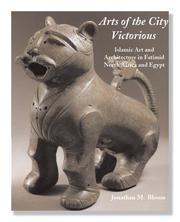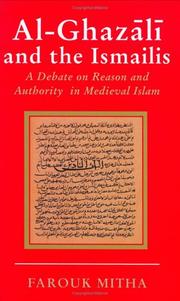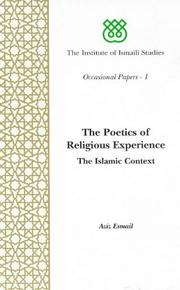| Listing 1 - 10 of 63 | << page >> |
Sort by
|
Periodical
Year: 2002 Publisher: London I.B. Tauris Publihers
Abstract | Keywords | Export | Availability | Bookmark
 Loading...
Loading...Choose an application
- Reference Manager
- EndNote
- RefWorks (Direct export to RefWorks)
Book
ISBN: 9780198701644 0198701640 Year: 2014 Volume: 10 Publisher: Oxford : Oxford University Press, in association with the Institute of Ismaili Studies,
Abstract | Keywords | Export | Availability | Bookmark
 Loading...
Loading...Choose an application
- Reference Manager
- EndNote
- RefWorks (Direct export to RefWorks)
We are used to understanding the Qur'an as the "Islamic text" par excellence, an assumption which, when viewed historically, is not evident at all. More than twenty years before it rose to the rank of Islamic Scripture, the Qur'an was an oral proclamation addressed by the Prophet Muhammad to pre-Islamic listeners, for the Muslim community had not yet been formed. We might best describe these listeners as individuals educated in late antique culture, be they Arab pagans familiar with the monotheistic religions of Judaism and Christianity or syncretists of these religions, or learned Jews and Christians whose presence is reflected in the Medinan suras. The interactive communication process between Muhammad and these groups brought about an epistemic turn in Arab Late Antiquity: with the Qur'anic discovery of writing as the ultimate authority, the nascent community attained a new 'textual coherence' where Scripture, with its valorisation of history and memory, was recognised as a guiding concept. It is within this new biblically imprinted world view that central principles and values of the pagan Arab milieu were debated. This process resulted in a twin achievement: the genesis of a new scripture and the emergence of a community. Two great traditions, then, the Biblical, transmitted by both Jews and Christians, and the local Arabic, represented in Ancient Arabic poetry, appear to have established the field of tension from which the Qur'an evolved; it is both Scripture and Poetry which have produced and shaped the new Muslim community. -- provided by publisher
Qur'an as literature. --- Arabic literature --- Islam --- Islam. --- History and criticism. --- Relations --- Christianity. --- Judaism. --- Qur'an --- Evidences, authority, etc. --- History. --- Qurʾan as literature. --- Authority --- Entstehung. --- Philologie. --- Religious aspects. --- Qurʾan --- Qurʾan. --- Koran. --- 297.181 --- Islam: canonieke boeken; Koran --- 297.181 Islam: canonieke boeken; Koran --- Koran --- Qurʼan as literature. --- Qurʼan --- Qurʼan. --- Al-Coran --- Al-Qur'an --- Alcorà --- Alcoran --- Alcorano --- Alcoranus --- Alcorão --- Alkoran --- Coran --- Curān --- Gulan jing --- Karan --- Koranen --- Korani --- Koranio --- Korano --- Ku-lan ching --- Ḳurʼān --- Kurāna --- Kurani --- Kuru'an --- Qorān --- Quräan --- Qurʼān al-karīm --- Qurʺon --- Xuraan --- Κοράνιο --- Каран --- Коран --- קוראן --- قرآن --- Arabic literature - History and criticism. --- Islam - Relations - Christianity. --- Islam - Relations - Judaism.

ISBN: 9780300135428 0300135424 Year: 2007 Publisher: New Haven : Yale University Press : In association with the Institute of Ismaili Studies,
Abstract | Keywords | Export | Availability | Bookmark
 Loading...
Loading...Choose an application
- Reference Manager
- EndNote
- RefWorks (Direct export to RefWorks)
Architecture, Fatimid --- Decorative arts, Fatimid --- Fatimid decorative arts --- Fatimid architecture

ISBN: 1860647928 9781860647925 Year: 2001 Volume: 5 Publisher: London I. B. Tauris
Abstract | Keywords | Export | Availability | Bookmark
 Loading...
Loading...Choose an application
- Reference Manager
- EndNote
- RefWorks (Direct export to RefWorks)
Ismailites --- Doctrines. --- Ghazzali --- Doctrines --- Ismailites - Doctrines.
Book
ISBN: 1848857640 9781848857643 Year: 2011 Publisher: London ; New York : New York : I.B. Tauris in association with the Institute of Ismaili Studies ; distributed in the United States of America and in Canada exclusively by Palgrave Macmillan,,
Abstract | Keywords | Export | Availability | Bookmark
 Loading...
Loading...Choose an application
- Reference Manager
- EndNote
- RefWorks (Direct export to RefWorks)
Manuscripts, Arabic --- Manuscripts, Persian --- Manuscripts, Gujarati --- Ismaili literature --- Manuscripts --- Hamdani, Abbas --- Institute of Ismaili Studies --- Manuscripts, Arabic - Catalogs --- Manuscripts, Arabic - England - London - Catalogs --- Manuscripts, Persian - England - London - Catalogs --- Manuscripts, Gujarati - England - London - Catalogs --- Ismaili literature - Manuscripts - Catalogs --- Hamdani, Abbas - Manuscripts - Catalogs
Book
ISBN: 9781784531539 1784531537 Year: 2015 Volume: 3 Publisher: London ; New York : I.B. Tauris Publishers in association with the Institute of Ismaili Studies,
Abstract | Keywords | Export | Availability | Bookmark
 Loading...
Loading...Choose an application
- Reference Manager
- EndNote
- RefWorks (Direct export to RefWorks)
Hurufis. --- Islamic sects. --- Sufism. --- Shīʻah. --- Sectes islamiques --- Messianisme --- Astarābādī, Faḍl Allāh al --- -Hurufis --- Islamic sects --- Sufism --- Shīʻah --- Astarabadi, Fazlallah, --- Hurufis --- Shīʻah. --- -Hurufis. --- Astarabadi, Fazlallah, - 1340-1394 --- Astarābādī, Faḍl Allāh al-
Book
ISBN: 9781784538958 1784538957 Year: 2017 Publisher: London : Tauris,
Abstract | Keywords | Export | Availability | Bookmark
 Loading...
Loading...Choose an application
- Reference Manager
- EndNote
- RefWorks (Direct export to RefWorks)
Among the various Muslim communities that were articulating their doctrinal positions in the early Islamic centuries, one in particular was known derisively as the Ghulat ('extremists'). This was owing to their specific interpretation of Islam, which included an 'extreme' devotion to the Shi'i Imams and the family of the Prophet, and controversial religious ideas, such as the transmigration of souls into other human or sub-human forms. Widely active in Iraq in the 8th and 9th centuries, the Ghulat developed a complex worldview and produced a rich religious literature. Until now, understanding of this community has mainly relied on sources produced outside of the group, which are inaccurate or polemical in nature. This book looks at newly recovered primary texts in order to study the Ghulat first hand. Mushegh Asatryan examines the development of the Ghulat writings, situating the community within a broader historical context and offering a comprehensive survey of their distinctive cosmology.Through his detailed analysis, the book offers insight into the formation of one of the earliest religious traditions in Islamic history as well as the nature of the community in which texts were produced and circulated.
Shīʿah --- Islamic sects --- History. --- Doctrines. --- Shīʻah
Book
ISBN: 9780197265130 0197265138 Year: 2012 Volume: 8 Publisher: Oxford Oxford University Press
Abstract | Keywords | Export | Availability | Bookmark
 Loading...
Loading...Choose an application
- Reference Manager
- EndNote
- RefWorks (Direct export to RefWorks)
Sufism --- Qushayrī, ʻAbd al-Karīm ibn Hawāzin, --- Qur'an --- Sofism --- Mysticism --- Islam --- Qushayrī, ʻAbd al-Karīm ibn Hawāzin, - 986-1072. - Lạtāʼif al-ishārāt
Book
ISBN: 1784531529 085773850X 1786739437 0755608984 9781786739438 Year: 2015 Publisher: London ; New York : I.B. Tauris, in association with the Institute of Ismaili Studies,
Abstract | Keywords | Export | Availability | Bookmark
 Loading...
Loading...Choose an application
- Reference Manager
- EndNote
- RefWorks (Direct export to RefWorks)
"I.B.Tauris in association with the Institute of Ismaili Studies Few fields of Islamic studies have witnessed as much progress in modern times as Ismaili studies, and in even fewer instances has the role of a single individual been as pivotal in initiating progress as that of Wladimir Ivanow (1886-1970), whose memoirs are now published here for the first time. The breakthrough in modern Ismaili studies occurred mainly as a result of the recovery and study of a large number of texts relating to the field, which had not been available to the earlier generations of orientalists. The Persian and Arabic Ismaili manuscripts, many edited and published by Ivanow, reflect a rich diversity of intellectual and literary traditions. Ivanow left his native Russia soon after the October Revolution of 1917 and settled in India where he was formally commissioned in 1931 by Sultan Muhammad Shah Aga Khan III, the 48th Imam of the Nizari Ismailis, to investigate the history and teachings of the Ismailis. Henceforth, Ivanow began the systematic recovery and study of texts from this tradition of Shi'i Islam, discovered in India, the Middle East and Central Asia, amongst other regions. He also played a key role in the establishment of the Ismaili Society - the first research institution of its kind with a major collection of Ismaili manuscripts. Ivanow made these manuscripts available to other scholars, thereby contributing to further progress in the field. Ivanow completed his memoirs, entitled Fifty Years in the East, in 1968, shortly before his death. This work, originally written in Russian, is comprised of an autobiography and vivid accounts from his travels. These convey his ethnologist's interest in 'the archaeology of the way of life' and profound curiosity for regional customs and languages. The memoirs, written in Tehran during Ivanow's final years, have now been edited with substantial annotations by Farhad Daftary. They reveal for the first time the circumstances under which modern Ismaili studies were initiated and an eyewitness account of several regions during the early decades of the twentieth century before the rapid onset of modernisation."--Bloomsbury publishing.
Ismailites. --- Ivanow, Wladimir. --- Ismailians --- Ismailis --- Assassins (Ismailites) --- Shīʻah --- Ivanow, W. --- Ivanow, Vladimir Alekseevich --- Иванов, Владимир Алексеевич --- Ivanov, Vladimir Alekseevich --- ايوانف ، ولاديمير --- و. ايوانف --- Memoirs.

ISBN: 9781860642401 1860642403 Year: 1998 Publisher: London: Tauris Academis Studies,
Abstract | Keywords | Export | Availability | Bookmark
 Loading...
Loading...Choose an application
- Reference Manager
- EndNote
- RefWorks (Direct export to RefWorks)
Experience (Religion) --- Poetics --- Islamic literature --- Islam
| Listing 1 - 10 of 63 | << page >> |
Sort by
|

 Search
Search Feedback
Feedback About UniCat
About UniCat  Help
Help News
News